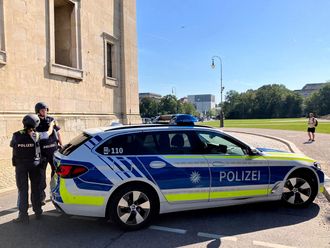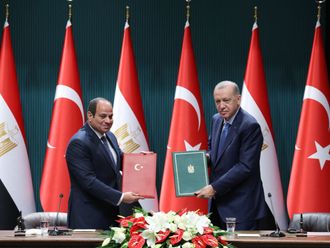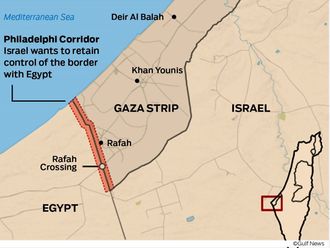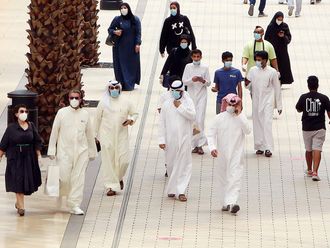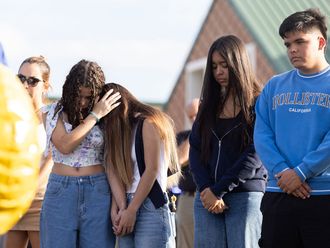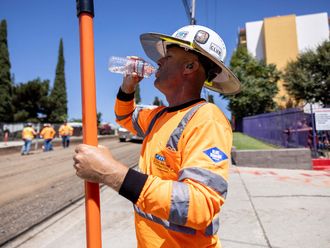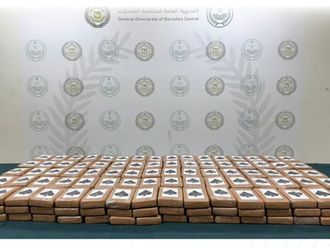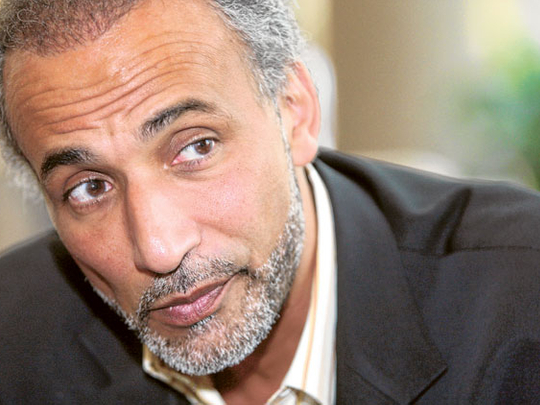
The year 2011 has been a very special one for the Arab masses. After decades of nothingness, and subservience even, the Arab street took things into their own hands and launched non-violent movements in Tunisia, Egypt, Yemen, Libya and Syria, resulting so far in the toppling of three dictators. It is safe to say some experiences have been "more successful" than others and that some have taken a different route of fighting against their relentless regimes. But to get a better perspective of what happened and why, and what we can expect in the near future, Weekend Review sat down with Dr Tariq Ramadan, professor of Contemporary Islamic Studies at St Antony's College, University of Oxford, to get his thoughts on the latest developments. Ramadan, who has already written a book on the so-called Arab Spring, to be released later this year, is "cautiously optimistic" as he spoke about the future of the Middle East.
Within minutes of our conversation, Ramadan is quick to dismiss the notion that the Arab uprisings sent shock waves everywhere. (Ramadan believes the "Arab Spring" is a misleading term and even refrains from calling the movements revolutions.) Instead, he brings our attention to the fact that the United States and Europe were involved in training non-violent and cyber dissident bloggers since 2004. He says that in September 2010 these bloggers had a meeting with Google in Budapest, where they were creating the first north African-Middle East blogger network. This was organised by Google and institutions connected to the US State Department. After this, many of the people were trained at the Albert Einstein Institute. So, he says, "they were trained and you can't say their governments didn't know".
Ramadan believes the Arab uprisings shouldn't be looked at from an emotional point of view and say they weren't expected. "The fact is," he says, "[Srdja] Popovic was the one who led all the popular mobilisations in Serbia and also trained Middle Eastern bloggers — he was involved in the whole process." How is this not a conspiracy theory? Because, he says, the Hosni Mubarak regime was aware of the training and subsequently arrested a number of bloggers upon their return to Egypt in 2008. And just a note on Popovic, since he helped oust Slobodan Milosevic in 2000, he has been busy promoting non-violent warfare. In 2003, he founded the Centre for Applied Non-Violent Action and Strategies (CANVAS) in Belgrade.
But is Ramadan putting too much emphasis on the bloggers or were they the story? "They're the driving forces," he says. The social network — the whole philosophy of it that worked in Serbia worked in Egypt. "But that's not to say it would have been impossible without it," he says. It has to be understood that there will be more opportunities in the future and people can still find new ways to bring about change.
So now that it has happened, can we say that countries such as Egypt and Tunisia are experiencing a new chapter in their history? Not so fast, says Ramadan. "There's a sense that the face of the Middle East is changing, but we still can't say that we're headed towards independent, autonomous and transparent democracies. What's missing in all discussions is the economic factor," he says. What he means is the lack of emphasis on the marginalisation of people, high levels of poverty and unemployment in the countries. So while, politically speaking, Arab uprisings weren't expected, economically speaking, they were.
He is right. There are still a lot of questions that need to be answered. Looking at the situation in Egypt and Tunisia, nothing is settled and figures from the old regime still appear in today's setting. The army is also still visible.
Pondering Egypt's problems
Ramadan pays special attention to Egypt in our conversation. This is hardly surprising, since he is Egyptian. Besides, there is the little detail that he is the grandson of Hassan Al Banna who, in 1928, founded the Muslim Brotherhood in Egypt. Ramadan's father, who was also a prominent figure in the Muslim Brotherhood, was exiled by Jamal Abdul Nasser from Egypt to Switzerland, which is where Ramadan was born and raised. He says the Swiss government has advised him not to travel to Egypt during this period because of its instability.
So, on February 11, did Ramadan join fellow Egyptians in jubilation when Mubarak stepped down? The answer is immediately a no.
"I was very cautious about the fall of Mubarak," he says. His biggest concern has to do with the level of discussions taking place in Egypt and Tunisia. "Egyptians are not ready for elections and they're still talking about secularists versus Islamists," he contends. If they don't have people from within the civil society who are reacting with new thoughts to tackle the real issues (poverty, economy, education, gender), he ponders, how will they solve their problems?
It remains to be seen how the Islamists will fit into a new Middle East. They have an opportunity to be part of a new system as they enjoy historical legitimacy. However, Ramadan cautions: "The Islamists are very quick to fall into the trap of viewing their legitimacy against seculars. We also have to ask whether they are offering a political alternative, an economic alternative."
Ramadan also says the Islamists are busy debating references to Sharia in the Egyptian constitution when they should be looking at providing an overall strategy. He says that if anything, they are today scattered in different directions: Some leaders don't want to be involved in politics. This is led by Ahmad Mursi.
Then there is Abdul Momin Abul Futouh, who is going it alone. There are also the young who are going in "Al Shabab Al Masri", or the Egyptian youth direction. And there are the Islamists who are aligning themselves with the left. The Muslim Brotherhood was united against a dictator, their unity based on the power of the dictator; his absence exposes their weakness.
To dig deeper into the Muslim Brotherhood issue and tackle its questionable reputation, I asked Ramadan directly: Would an Islamist takeover in the Middle East be a terrible thing? Again, he is cautious; he says we have had bad experiences and propaganda. "In the West, they know that if the Islamists take over, it won't be possible for them to deal with those countries to protect their interests in the same way; so they demonise them," he says.
On the other hand, in Muslim majority countries such as Iran, there are questions on how Islam is implemented. "The very meaning of Sharia and how to implement it is not always clear and there's confusion on how non-Muslims, morality and culture are handled," Ramadan argues. So between this demonisation and idealisation, there is space for critical thinking. "As long as they don't advocate violence, abide by the rule of law and accept the democratic process before and after the election, they should be involved in the political process. It's the only way for them to evolve," he adds. They could also look to Turkey for inspiration. While so much has been made of Recep Erdogan's leadership skills, Ramadan says Turkey has managed to come up with a good governance system and put the army in the barracks — outside the political structure — which is imperative for its leadership's success.
Leaderless dynamism
Surely, though, the Arab Spring or Arab uprisings help explain the Arab world? Ramadan thinks this is an important point to bring up.
"We have energy and dynamisms; we have the majority of the people in the Arab world who are young and energetic," he says without breaking concentration. This is all too well. But, he points out, between "using the means and the technology and getting the political sense, there's no vision, and this is utterly important".
These are leaderless uprisings and it was specifically this setting that allowed the uprisings in Tunisia and Egypt to succeed. That these movements didn't have a specific leadership allowed them to concentrate on their dictator, making it a political message as apposed to just channelling their anger towards the West.
But it is rather ironic that the very reason for their success (no leadership) is also why they are weak today. Ramadan says that today, more than ever, they need political clarity and vision. He especially wants the people of Tunisia and Egypt to escape the decades-long dictator-imposed binary vision that pits the secularists against the Islamists in an attempt to polarise the political debate. It is this setting, he says, that allows the army a chance to play the role of arbitrator.
His advice? Civil society intellectuals must find a new way (through more transparency) to govern and unite. Otherwise they will end up with a controlled democracy. Is it fair to say that because Arabs are not used to democracies, it is taking them a long time to figure it out?
Ramadan is quick to point out that democracy is not an overnight process, it takes time. "Arabs are capable and they have the history, the memory and the reference to reach that level," he says.
The way he puts it, Arabs must try to be the subject of their history and not the object of their control, that is, going towards autonomy. This will take time but it will still be a positive experience.
I also raise the topic that many academics have stipulated that these Arab uprisings have had a very strong impact on Arab nationalism, a concept that enjoyed popularity and support in the 1950s and the 1960s but quickly died down with the advent of dictators. So is this a moment of revival? Ramadan says that for these individual uprisings to succeed, they need to become "national uprisings".
"You're not going to get transparent democracy or true democratisation if you only focus on your country," he argues. That is, economic stability, which is a transnational problem, is at the heart of this quest for political freedom. And there is an urgent need for new regional political thinking. "Going back to 1950s nationalism would be a regression, because we're talking today about true democracies and autonomy [not national independence]," he adds.
And let us not forget Palestine. "If we are going towards true democracies," he says, "that direction would obviously go against Israel. Israel doesn't want democracies; controlled democracies, however, it could live with."
To put it simply, Ramadan says, "The Israeli-Palestinian conflict could become and should become a central issue for all these uprisings if Arabs understand that they have to connect and come up with one vision."
While it is difficult to be overly optimistic today, it sounds like the Arab uprisings of 2011 will be remembered as the beginning of a different era in Middle Eastern history, one that is not bogged down by dictatorship and injustice. The youth have shown a strong desire to build more equitable Arab societies, and that requires a lot of work, transparency and healthy participation.
Erudite scribe
Dr Tariq Ramadan, who holds a PhD in Philosophy, Arabic and Islamic Studies from the University of Geneva, is known for his substantial contributions to the debate on contemporary Islamic issues, and perceptions and misperceptions about Islam. In fact, he is an adviser to the European Union on religious issues.
Dr Ramadan is at present a professor of Contemporary Islamic Studies at Oxford University. He is also a visiting professor in Qatar and director of a new research centre there that tackles Islamic legislation and ethics. Its areas of focus are medicine, education, gender, environment, economy, arts and food.
Dr Ramadan was also to teach in the United States in 2004 before he faced major problems with his visa, which was eventually revoked by the US government.
As Dr Ramadan donated to two charities supporting Palestinian projects, in the US he was suspected of providing material support to a terrorist organisation (linking it to Hamas). After a lengthy legal battle, Hillary Clinton lifted the ban on him in January 2010.
His books include What I Believe and Radical Reform, Islamic Ethics and Liberation. He has just finished writing a book on the latest events in the Arab world, titled Islam and the Arab Awakening, which will be released at the end of the year.



